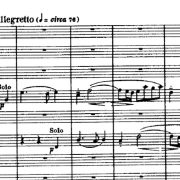Fantasia & Fugue in C minor: Deal? No deal!
Many say that Elgar’s Cello Concerto was his last notable work. After the premiere of the Cello Concerto in late 1919 and his wife Alice’s death in 1920, it seemed like he has lost the willingness to compose. His wife has always been a source of inspiration and support to Elgar. Her death and the lack of public demand of music from him (his work went out of fashion) led to the refocus of his attention to other hobbies.
Instead of any new major works, Elgar turned his attention to orchestrating the works of the old masters. He was no newcomer to transcribing – before he committed to pursuing a career as a composer he used to transcribe such works for the various performance groups he was associated with.
No deal!
When Elgar met with his long-time friend Richard Strauss in 1920, the 1st World War was still on people’s mind and they were eager to heal the rift. He suggested a joint project to orchestrate Bach’s Fantasia & Fugue in C minor, BWV 537. Elgar would do the Fugue whilst Strauss would do the Fantasia.
Nothing came of the deal. Whilst Elgar did finish orchestrating the Fugue, Strauss did not. Subsequently, when he was asked to “write something” for the 1922 Three Choirs Festival, he remembered this incomplete orchestration and set about to do the Fantasia as well. Thus the orchestrated version of the Fantasia & Fugue was born.
Come hear us perform Elgar’s magnificent orchestration of Bach’s Fantasia & Fugue in C minor, Saint-Saëns’ “Organ Symphony” and more in the upcoming Learners concert on May 10, 2017! Contact us at 9234 6057 or by email at learnershk@gmail.com for ticketing and donation enquiry.

